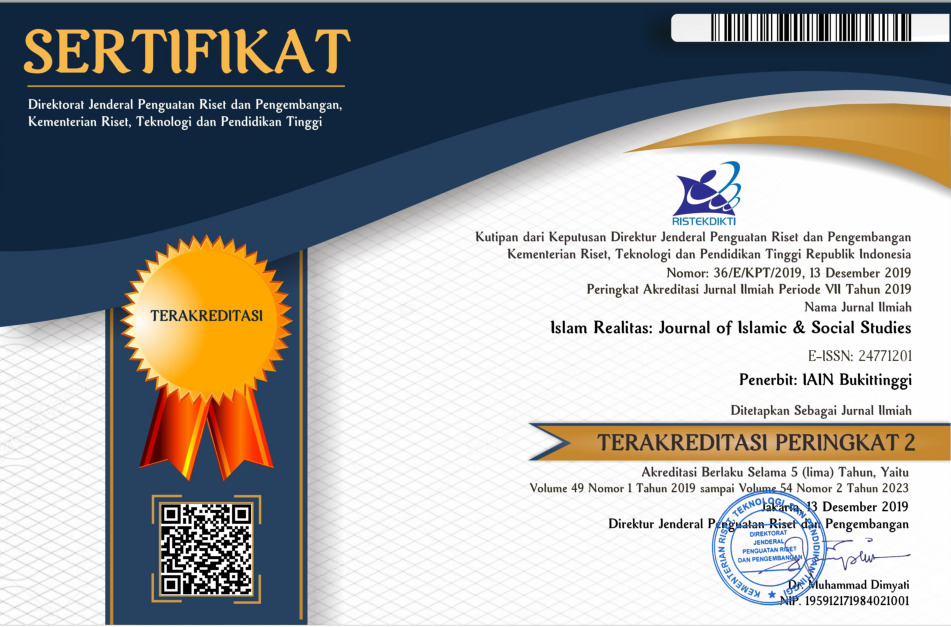Puritanical Discourse in ‘Abd al-Hamīd al-Khatīb’s Nahj al-Burdah: Response to Excessive Praise of the Prophet
DOI:
https://doi.org/10.30983/islam_realitas.v10i1.8450Keywords:
al-Madīḥ al-Nabawī, Nahj al-Burdah, Puritanism, GhuluwwAbstract
References
Books
al-Khaṭīb, ‘Abd al-Ḥamīd, Aḥmad al-Khaṭīb: Bā‘īth al-Nahḍah al-Islāmīyah al-Taḥrīrīyah fī Indunūsiyā, al-Mudarris wa-al-Khaṭīb bi-al-Masjid al-Ḥarām, wa-al-Imām bi-al-Maqām al-Shāfi‘ī (Saudi Arabia, 1958).
———, al-Imām al-‘Ādil: Ṣāḥib al-Jalālah al-Mālik ‘Abd al-Azīz ibn ‘Abd al-Raḥmān al-Fayṣal Sa‘ūd (Cairo: Muṣṭafá al-Bābī al-Ḥalabī, 1951)
———, Asmá al-Risālāt (Cairo: Dār al-Kitāb al-‘Arabī, 1954)
———, Munājātullāh (Cairo: Muṣṭafá al-Bābī al-Ḥalabī, 1938)
———, Nahj al-Burdah (Makkah, 1937)
———, Tafsīr al-Khaṭīb al-Makkī (Cairo: Muṣṭafá al-Bābī al-Ḥalabī, 1947)
Eriyanto, Analisis Wacana: Pengantar Analisis Teks Media (Yogyakarta: LKiS, 2012)
Fairclough, Norman, Discourse: Textual Analysis for Social Research (London and New York: Routledge, 2003)
al-Bukhārī, Ṣaḥīḥ al-Bukhārī (Karachi: al-Bushra, 2016)
Ibn Manẓūr, Lisān Al-‘Arab (Beirut: Dār al Iḥyā’ Turāth al-‘Arabī, 1985)
Mubārak, Zakī, al-Madā’iḥ al-Nabawīyah fī al-Adab al-‘Arabī (Beirut: Dār al-‘Ilm, 1935)
Nazwar, Akhira, Ahmad Khatib: Ilmuan Islam di Abad Ini (Jakarta: Pustaka Panjimas, 1983)
Noer, Deliar, Gerakan Modern Islam di Indonesia (1900-1942) (Jakarta: LP3ES, 1982)
Subhan, Ja’far, Tentang Dibenarkannya Syafa’at dalam Islam Menurut Al-Qur’an dan Sunnah (Jakarta: Pustaka Hidayah, 1992)
Teeuw, A., Sastra dan Ilmu Sastra: Pengantar Teori Sastra (Jakarta: Pustaka Jaya, 1998)
Ridwan, Nur Khalik, Sejarah Lengkap Wahhabi: Perjalanan Panjang Sejarah, Doktrin Amaliah dan Pergulatannya (Yogyakarta: IRCiSoD, 2020)
Hamka, Ayahku: Riwayat Hidup DR. H. Abdul Karim Amrullah dan Perjuangan Kaum Agama di Sumatera (Jakarta: Umminda, 1982)
al-Luwayḥiq, ‘Abd al-Raḥman ibn Mu‘allā, al-Ghuluww fī al-Dīn fī Ḥayāti al-Muslimīn al-Mu‘āṣirah (Beirut: Muasasat al-Risālah, 1421)
al-Subḥānī, Ja‘far, al-Wahābīyah fī al-Mīzān (Qom: Mu’assast al-Nashr al-Islāmī, 1995)
‘Abd al-Wahhāb, Muḥammad, Kashf al-Shubhāt (Riyadh: Wizārat al-Shu’ūn al-Islāmiyah wa-al-Awqāf wa-al-Da‘wah wa-al-Irshād, 1418)
———, Language and Power (New York: Addison Wesley Longman, 1989)
Journal
Abū Najā, Fā’iz Muḥammad Ḥasan, ‘Shafā‘at al-Rasūl Ṣallallāh ‘Alayhi wa-Sallām wa-Wasā’il al-Ḥuṣūl ‘Alayhā’, Majallah Kullīyat a-Dirāsāt al-Islāmīyah wa-al-‘Arabīyah li-al-Banīn bi-al-Qāhirah, 34.2 (2017), 1797–1879 <https://doi.org/https://doi.org/10.21608/bfsa.2017.26813>
Elatrash, Radwan Jamal, and Luqman al-Hakim, ‘Mawqif al-Imām al-Zamakhsharī min Shafā‘at al-Nabī Ṣallallāhu ‘Alayhi wa-Sallām li-Aṣḥāb al-Kabā’Ir: Dirāsah Taḥlīlīyah’, Journal of Islam in Asia, 12.2 (2015), 49–100 <https://doi.org/10.31436/jia.v12i2.482>
Engku Wok Zin, Engku Ibrahim, Abdul Rahman Mahmod, and Syed Hadzrullathfi Bin Syed Omar, ‘Syaikh Muhammad Bin Abd Al-Wahhab dan Kaitannya dengan Isu Takfir’, Jurnal Islam dan Masyarakat Kontemporari, 4 (2011), 61–72 <https://journal.unisza.edu.my/jimk/index.php/jimk/article/view/24> [accessed 31 August 2024]
Hamang, M. Nasri, ‘Sirik dan Wasilah dalam Al-Qur’an: Sebuah Kajian Syar’iyyah Berdasarkan Metode Tafsir Maudhu’i’, Jurnal Ilmiah Al-Syir’ah, 1.1 (2003), 89–98 <https://doi.org/http://dx.doi.org/10.30984/as.v1i1.189>
Meisam, Sadiq, ‘Ghuluww and the Belief in Supernatural Abilities for Human: An Investigation into the Concept of Ghuluww in the Qur’an’, Turkish Journal of Shiite Studies, 5.1 (2023), 6–27
Muḥammad Ṭaha, Abū Ṣāliḥ, ‘Ta’thīr al-Shi‘r al-‘Arabī al-Ḥadīth fī al-Ḥurrīyah’, Journal of Islam in Asia, 16.3 (2019), 191–214 <https://doi.org/https://doi.org/10.31436/jia.v16i3.911>
Murtado, Diran, and Muhammad Roflee Waehama, ‘Islamic Puritanism and Wahhabi Development’, Focus, 5.1 (2024), 33–40 <https://doi.org/https://doi.org/10.26593/focus.v5i1.7658>
Rwashdeh, Hamed, ‘The Intermingling of Alana with the Formation of the Intellectual Structuralism in the Poetry of Mahmoud Sami Albourdi’, Dirāsāt: Human and Social Sciences, 44.2 (2017), 127–39 <https://archives.ju.edu.jo/index.php/hum/article/view/8477> [accessed 31 August 2024]
Setiana, Unang, Zouhrotunni’mah, and Yono, ‘Dampak Pemikiran Tauhid Muhammad Bin Abdul Wahhab dan Abul Hasan Al-Asy’ari terhadap Dakwah Kontemporer’, Komunika: Journal of Communication Science and Islamic Da’wah, 2.2 (2018), 146–62 <https://jurnalfai-uikabogor.org/index.php/komunika/article/view/426>
Sinani, Besnik, ‘Devotional Extremism (Ghuluww)? Muḥammad ʿAlawī Al-Mālikī and the Debate over the Veneration (Taʿẓīm) and the Characteristics (Khaṣāʾiṣ) of the Prophet Muḥammad in Saudi Arabia’, in The Presence of the Prophet in Early Modern and Contemporary Islam, ed. by Denis Gril, Stefan Reichmuth, and Dilek Sarmis (Leiden: Brill, 2023), pp. 489–52
Stetkevych, Suzanne Pinckney, The Mantle Odes: Arabic Praise Poems to the Prophet Muhammad, The Mantle Odes: Arabic Praise Poems to the Prophet Muhammad (Indiana: Indiana University Press, 2010) <https://doi.org/10.5860/choice.48-2516>
Ulum, Itah Miftahul, ‘Konsepsi Tauhid Menurut Abdul Wahhab dan Implikasinya bagi Tujuan Pendidikan Islam’, Logika: Jurnal Ilmiah Lemlit Unswagati Cirebon, 9.3 (2013), 94–105 <https://jurnal.ugj.ac.id/index.php/logika/article/view/1074> [accessed 31 August 2024]
Weinrich, Ines, ‘Between Poem and Ritual: The Burda by Al-Būṣīrī (d. 1294-1297)’, in Performing Religion: Actors, Contexts, and Texts. Case Studies on Islam, ed. by Ines Weinrich (Beirut and Würzburg: Ergon Verlag, 2016)
———, ‘Forms of Piety as Reflected in Arabic Literature: Introduction’, in In Praise of the Prophet: Forms of Piety as Reflected in Arabic Literature, ed. by Ines Weinrich (Baden-Baden: Ergon Verlag, 2022)
Downloads
Published
How to Cite
Issue
Section
Citation Check
License
Copyright (c) 2024 Rosalinda, Nurdin, Andri Ilham

This work is licensed under a Creative Commons Attribution-ShareAlike 4.0 International License.
Authors who publish with this journal agree to the following terms:
- Authors retain copyright and grant the journal right of first publication with the work simultaneously licensed under a Creative Commons Attribution License that allows others to share the work with an acknowledgment of the work's authorship and initial publication in this journal.
- Authors are able to enter into separate, additional contractual arrangements for the non-exclusive distribution of the journal's published version of the work (e.g., post it to an institutional repository or publish it in a book), with an acknowledgment of its initial publication in this journal.
- Authors are permitted and encouraged to post their work online (e.g., in institutional repositories or on their website) prior to and during the submission process, as it can lead to productive exchanges, as well as earlier and greater citation of published work (See The Effect of Open Access).




